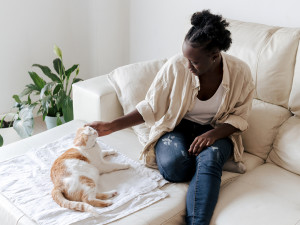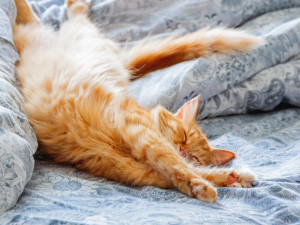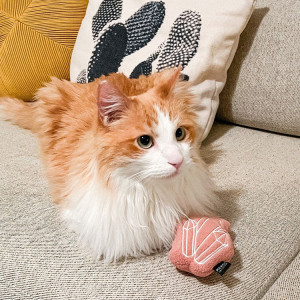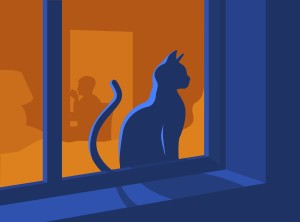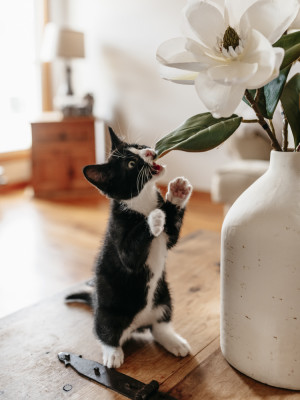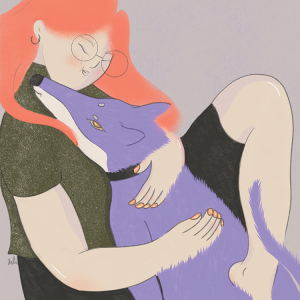Does Your Scent Actually Help Calm Your Cat?
They want you around more than your sweaty T-shirt in their carrier, but thanks for the thought.
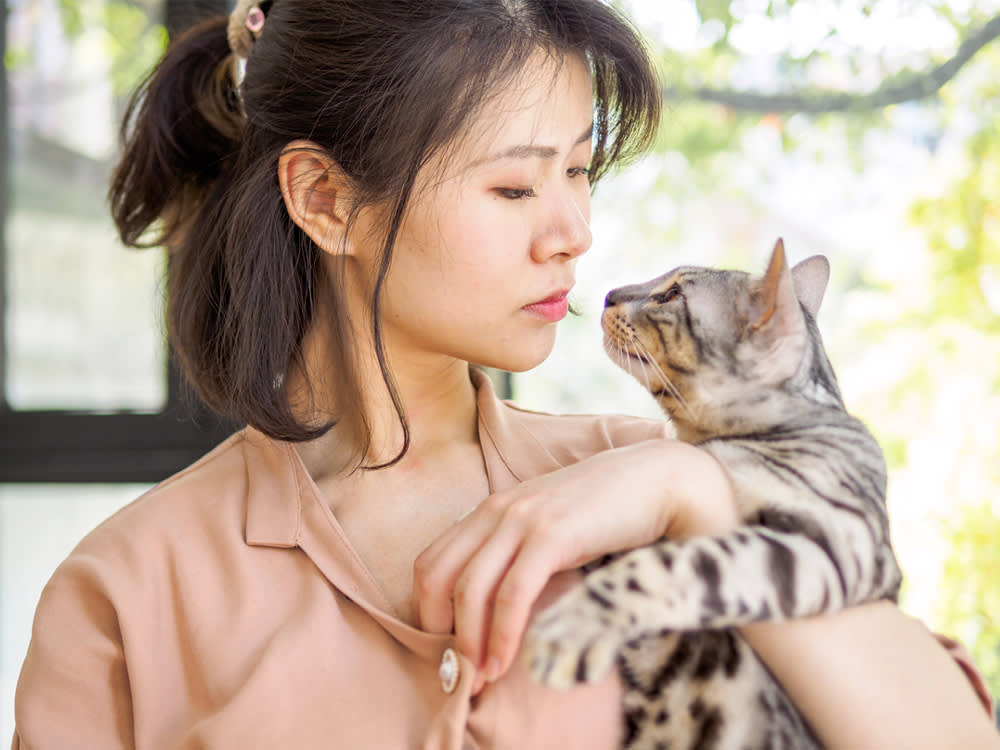
share article
Stress in cats can be a dangerous thing. It can negatively affect their health and lead to behavior problems, like aggression or peeing outside of the litter box.opens in a new tab But even the most pampered and coddled cats can’t avoid stress all the time. Trips outside the home and interactions with new and potentially upsetting stimuli are inevitable. The important thing is to try to mitigate that stress as best you can, so it doesn’t cause long-term damage.
A recent study published in the journal Frontiers in Veterinary Scienceopens in a new tab looked at the stress-reducing effect of scent on cats. According to the study, the parts of a cat’s brain that control stress response are intimately connected to the parts that process smells. That said, it would stand to reason that scent could be used to modify stress and related behaviors in cats. The study found that there is anecdotal evidence that scent manipulation can have a calming effect on cats, but the findings are spotty at best.
This is not to say that the stress-scent connection doesn’t exist; it may be more subtle or complicated than we think. The fact is, cats have extremely sensitive noses and are even better at differentiating opens in a new tabbetween different scents than dogs. But scent alone is often not enough to cause a significant or prolonged change in a cat’s mood or behavior. For instance, adding prey odor to a room is unlikely to elicit much of a response in a cat without the visual or auditory stimuli of the prey present as well. Cats are sensitive to smells, but other senses — sight and sound — often take precedence.
For that reason, simply putting a T-shirt you’ve worn in your cat’s carrier may not be enough to calm or comfort them on, say, a trip to the vet. In fact, the study found that the presence of objects with the parent’s scent on them did nothing to comfort cats. What did comfort the cats was the presence of their parents themselves.
So, does that mean you shouldn’t put your sweaty old shirt in your cat’s carrier? Not necessarily. All cats are different and as the study points out, genetics and conditions in their early environment can have a direct impact on how your cat is affected by scent. Scent alone is just not enough to help cats. In fact, the study found that fear could actually inhibit a cat’s response to scent, meaning that even if they do find your scent comforting, they won’t be able to reap the benefits of this comfort until they feel safe and secure.
Alternative Ways to Calm Your Cat
So, how do you make a cat feel safe and secure? Certified feline behaviorist Jennifer Van de Kieftopens in a new tab has some suggestions.
Play calming music.
“This is my favorite calming support for clients,” says Van de Kieft, who suggests the website Music For Cats opens in a new tabwhen searching for a supportive soundtrack for your stressed-out kitty.
Cover their carrier.
“Covering the carrier so the cat can’t see out helps reduce stimulation and can have a calming effect on cats,” Van de Kieft says. “Just make sure the cat has air.”
Give them a calming supplement.
Van de Kieft suggests L-Theanineopens in a new tab or Zylkeneopens in a new tab.
Feliway sprayopens in a new tab added to the carrier may have some effect — especially when combined with other means of stress mitigation — but the study found little to no reproducible evidence of it. The study also found that scents, such as lavender, that have a calming effect on humans, did nothing to calm cats.
That said, if lavender makes you feel calm, using it around your cat could be beneficial. After all, cats tend to be very in tune with the moods of their humans and look to them for reassurance. In fact, a 2015 study found that cats will often look to their humans to know how to react to new and confusing stimuli. If the human looks or sounds freaked out by the new stimuli — such as, for instance, a fan with streamers attached to the blades — the cat most likely will be, too. So, if you are calm, your cat is more likely to be calm as well. And if sniffing some lavender is how you get to that zen place, then so be it.

Charles Manning
Charles Manning is an actor, writer, and fashion/media consultant living in New York City with his two cats, Pumpkin and Bear. Follow him on Instagram @charlesemanningopens in a new tab.
Related articles
![cat with the crystal toy in pink]() opens in a new tab
opens in a new tabYou Can Transfer Your Woo-Woo Crystal Habit to Your Stressed-Out Cat
Merci Collective founder Chani Ronez on her new collection of crystal and catnip-infused toys for cats.
![]() opens in a new tab
opens in a new tabThis Study Says You Literally Can’t Hide From Your Cat
Happy spooky season.
![]() opens in a new tab
opens in a new tabHow to Read Your Cat’s Poker Face
A guide to their not-so-secret tells.
- opens in a new tab
How to Stop Your Cat From Munching On All of Your Precious Plants
Tips to get your cat to quit eating your greens.
![woman smiling looking at small Australian Shepard]() opens in a new tab
opens in a new tabWhat Is a Pet Wellness Plan, Really?
It sounds great, but here’s how it actually works.
![Illustration of a woman hugging a dog]() opens in a new tab
opens in a new tabYour Dog Can Smell When You’re Stressed, New Study Says
Research finds that your pup can smell when you’ve been doom-scrolling, and they get bummed out.

